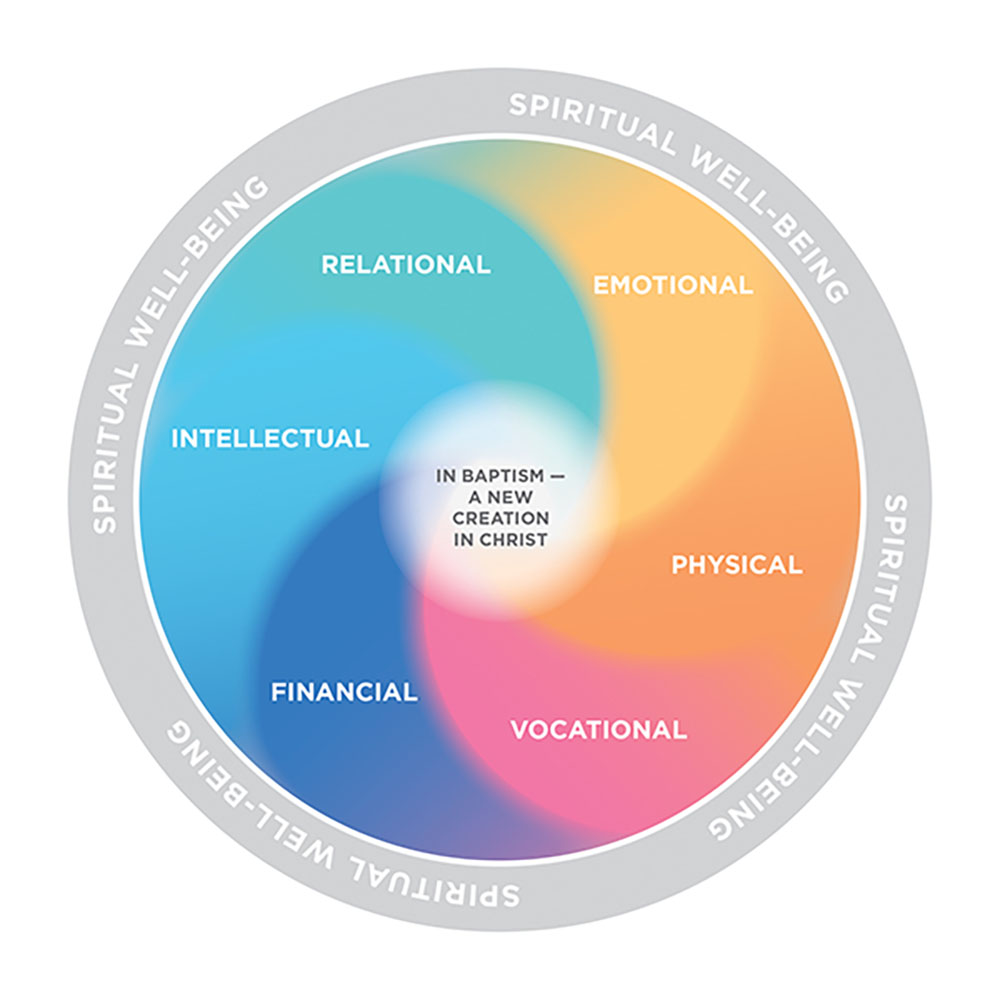Editor’s Note: This new series from LCMS Church Worker Wellness is hosted here on The Lutheran Witness site. Visit the “Ministry Features” page for regular Worker Wellness content.
As Lutherans, we understand that the various aspects of our wellness — intellectual, emotional, relational, physical, financial and vocational — relate to and depend upon one another, and are all rooted in our Baptism, our true identity as new creations in Christ. We understand spiritual well-being not as a facet of our wellness, but as fundamental to any and all facets of wellness for a Christian.
The following reflection, written by the Rev. James Otte, explores the theology of vocational well-being.

“I therefore, a prisoner for the Lord, urge you to walk in a manner worthy of the calling to which you have been called” (Eph. 4:1).
“Calling” or “vocation” is not a foreign idea to most professional church workers. We understand the notion, because it is rooted both in our Baptism and the purpose behind the context in which we work. In Baptism, God calls us to be His own, expressed in the same words He gave to Jesus in His Baptism: “You are My child, whom I love. With you I AM well pleased.” Baptism creates the initial moment in which we receive the voice which calls us, and it offers the power we need to be sustained when the work is hard to do. But as familiar as the idea of vocation is to many of us, what we don’t think much about is vocational “health” or “well-being.”
What is “vocation”? More than simply one’s work or career, our understanding moves us into the realm of God’s specific call to ministering. That makes vocation contextual — that is, it takes place with someone, and to someone, and in some place. One’s vocation could be as an educator in a school setting, a pastor in a congregational setting, a director of Christian education in an education or youth ministry setting, a church musician in a congregational setting, a chaplain in an institutional setting, and so on. The context does not determine the validity of the vocation, but the health of the context certainly affects our health and wellness as we exercise the call.
The health or wellness of the context in which we serve impacts our sense of fulfillment in our work within our vocation. If the school or congregation is in perpetual conflict, if it is in constant financial survival mode, or if the environment is not open to creativity and new approaches, then the context in which we serve affects our motivation to serve. Called workers will still serve out of the joy we have with our Lord, but the wear and tear of such an environment can drain the positive energy out and replace it with depression or apathy.
Dr. John Eckrich writes in his book on vocation, “A person should be happy and satisfied with his or her vocation, so it is important to understand our gifts and passions. This does not mean that everything is peaches and cream. But one must feel productive, qualified, purposeful, and fulfilled by his or her daily work.”1
Every professional church worker knows that the identifiable feeling of “peaches and cream” vibrant health and vitality happens occasionally, but not always. The daily work can, at times, feel like a daily grind because in working with people, it’s difficult to quantify productivity in a measurable way. Growth in faith and discipleship cannot often be measured by way of numbers, though we attempt to do so (i.e., worship attendance, number of Baptisms, how many people participate in an event, how many people gave us positive feedback). Ministry is often a “two steps forward, three steps backward” process, thus contributing to the likelihood that a worker will feel inadequate in their setting or in ministry as a whole, which often leads to questioning the validity of one’s calling or vocation.
Scarcity, Growth and Well-Being
Certainly, the Scriptures offer wisdom applicable to the tensions present in our vocations. St. Paul, writing in Philippians 4:11–13, speaks of learning the secret to contentment, which is the antidote to those feelings of inadequacy. Contentment shifts our focus from the temptation of comparing our failings to others’ successes and our vocational struggles to others’ apparent ease. Contentment moves us out of what Dr. Brene Brown, clinical social worker and shame researcher, labels as a mindset of “scarcity,” with its condemnation of “not enough,” into the victorious “I can do all things through Him who strengthens me.”
So, what are some practical ways to move from scarcity, lack, frustration and discontentment in our ministries and vocational lives to vitality and well-being in ourselves and the context in which we serve? One way is to pay attention to our “sweet spot ratio.” “Sweet spot” is a term often used in the sports world to describe the spot on a baseball bat or golf club or tennis racket. It is where, when the ball comes into contact with that spot, the optimal effect is realized: a hit, the perfect shot, the winning ace. The sound the ball makes is sweet, and the result is satisfying.
One’s sweet spot in ministry refers to any activity, task or responsibility that a person feels confident and joyful while doing. The sweet spot will differ from person to person, but the feelings of it are consistent. Common expressions of finding and working in the sweet spot are:
- “This is what I was born to do.”
- “I can’t believe they are paying me to do this.”
- “This activity is so me.”
- “This fits me to a T.”
- “I feel so confident in this.”
- “This is why I get up in the morning.”
Common experiences accompany us when we are ministering in our sweet spot:
- It is within our comfort zone, even if it is stretched a bit.
- It is a character strength we already have.
- We enjoy doing it.
- We don’t procrastinate doing it.
- We have skills and an aptitude for it.
- We enjoy learning how to do it better and more effectively.
- Other people confirm that this is right in our wheelhouse!
Examples of such things are: preaching, preparing lesson plans, playing with children, leading a discussion, playing a certain kind of music, creatively writing articles for Synod publications, etc. When we are in our sweet spot, it feels as if time slows down. We are in the zone!
Not every activity or responsibility, however, can be in the sweet spot, and most professional church workers find that some of their vocational duties take them out of the joy zone. This is true for everyone (even people who are not in professional church work). Vocational researchers suggest it is a good idea to pay attention to keeping a healthy ratio of sweet spot to non-sweet spot activities. An excellent goal is 70% sweet spot to 30% non-sweet spot.
Studies in what contributes to burnout and apathy among professional workers (teachers, nurses, dentists, social workers, etc.) reveal that among the factors that do in fact lead to burnout and apathy is the feeling that more and more of the activities they are required to do aren’t in their strength zone. In other words, the requirements of the institution become overwhelming because they poke at our weaknesses, frustrate us more easily, are not things we feel confident in doing, and might even feel outside our calling. When the ratio shifts from 70/30 to 50/50 or even less, our joy is diminished, and we begin to entertain the possibility of a permanent change. It’s good to do things that leave us feeling uncomfortable. It’s good to wrestle with how God would have us steward our time in ministry, but the sweet spot idea helps us to personally gauge how and where we can best spend our time and energy in ministry while maintaining well-being personally. It helps us balance the desires of the context of our ministry with our own skills, strengths and what we hear God calling us to do as we study His Word.
Keeping a healthy ratio may require a conversation with our employer or senior leadership. Or it may require a change in environment. Such changes can include seeking a redefinition of our job description or a move between staff positions. For some workers, this may involve notifying the district president of the desire to be put on a call list. One option, which is more and more common, is that of moving into a bi-vocational or “worker-priest” situation. Especially as some settings are increasingly unable to financially support a full-time worker with a full salary and benefits packages, workers are moving into this form of service, which has benefits and drawbacks, like any vocational setting or context.
Of course, there are challenges inherent in “serving two masters,” so to speak. As God’s children, we are never called to one vocation only. We are husbands, mothers, neighbors and more in addition to the vocations of our ministry. Challenges inherent to this include the time demands on the worker, when both employers and the family want him/her in the same time and on the same day. It is wise to put intentional effort into a reasonably balanced ministry life. Such effort will help the minister maintain his/her vocational fidelity and enjoy the fruits of wellness. However, investing this kind of effort requires strength, time and energy the minister may think he/she does not have to invest. So, let the worker be cautioned and encouraged: You are worth it! You are worth the investment for the sake of your health, your loved ones and your ministry.
Finally, when you find yourself in a difficult vocational circumstance, seek out someone who can help you sort through what you need to once again find fulfillment and joy in ministry. There are counselors and spiritual companions who can walk alongside of you as you faithfully seek our Lord’s will for your ministry and life.
In the end, Jesus is still Lord and Savior in every single one of our vocations, contexts, settings and relationships. He fills all our needs, granting us the knowledge our sins are covered and our weaknesses filled in Him. We look to Him and His Word when we are troubled, apathetic, burnt out or struggling vocationally. He makes us well in His salvation and gives us many resources to find contentment in the midst of struggle and questions.
1 John D. Eckrich, Vocation and Wellness: Renew Your Energy for Christian Living (Elgin, Ill., and Tyler, Texas: Tenth Power Publishing, 2016), 38.
This theological reflection first appeared in the 2021 booklet “A Lutheran Perspective on Well-Being” (LCMS).
In the coming months, you will hear more about the work of LCMS Church Worker Wellness initiative, including new resources and more. Stay tuned to Reporter, The Lutheran Witness and the LCMS Church Worker Wellness site for updates.





